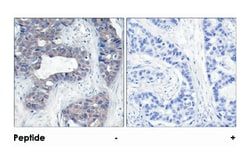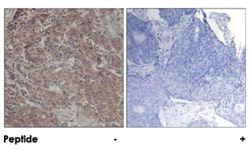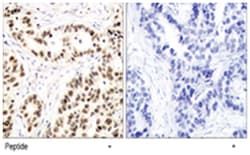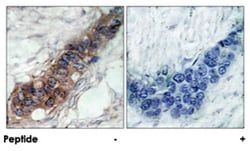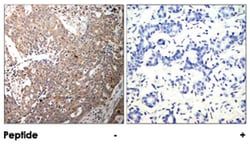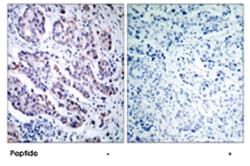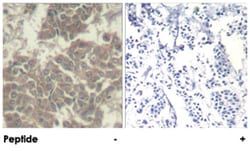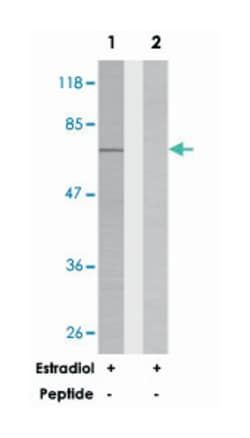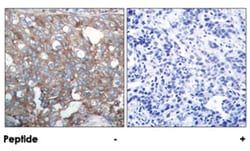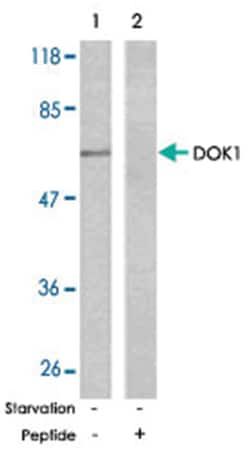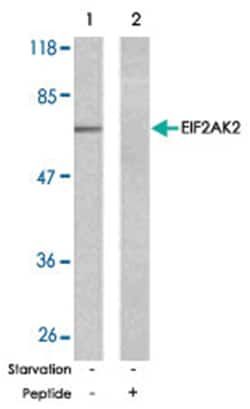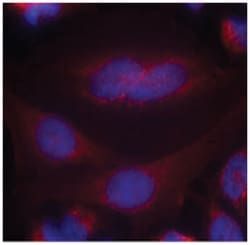89-128-435
CTTN Rabbit anti-Human, Mouse, Polyclonal Antibody, Abnova™
Manufacturer: Abnova Corporation
Select a Size
| Pack Size | SKU | Availability | Price |
|---|---|---|---|
| Each of 1 | 89-128-435-Each-of-1 | In Stock | ₹ 53,133.00 |
89-128-435 - Each of 1
In Stock
Quantity
1
Base Price: ₹ 53,133.00
GST (18%): ₹ 9,563.94
Total Price: ₹ 62,696.94
Antigen
CTTN
Classification
Polyclonal
Conjugate
Unconjugated
Dilution
Immunohistochemistry (1:50-1:100) The optimal working dilution should be determined by the end user.
Gene
CTTN
Gene Alias
EMS1/FLJ34459
Host Species
Rabbit
Purification Method
Affinity chromatography
Regulatory Status
RUO
Gene ID (Entrez)
2017
Content And Storage
Store at -20°C.Aliquot to avoid repeated freezing and thawing.
Applications
Immunohistochemistry (PFA fixed)
Concentration
1 mg/mL
Description
Rabbit polyclonal antibody raised against synthetic peptide of CTTN.
Formulation
In PBS, 150mM NaCl, pH 7.4 (50% glycerol, 0.02% sodium azide)
Gene Accession No.
Q14247
Gene Symbols
CTTN
Immunogen
A synthetic peptide corresponding to residues surrounding Y421 of human CTTN.
Quantity
100 μg
Primary or Secondary
Primary
Target Species
Human, Mouse
Form
Liquid
Description
- This gene is overexpressed in breast cancer and squamous cell carcinomas of the head and neck
- The encoded protein is localized in the cytoplasm and in areas of the cell-substratum contacts
- This gene has two roles: (1) regulating the interactions between components of adherens-type junctions and (2) organizing the cytoskeleton and cell adhesion structures of epithelia and carcinoma cells
- During apoptosis, the encoded protein is degraded in a caspase-dependent manner
- The aberrant regulation of this gene contributes to tumor cell invasion and metastasis
- Two splice variants that encode different isoforms have been identified for this gene
- [provided by RefSeq Sequence: P-I-Yp-E-D
Compare Similar Items
Show Difference
Antigen: CTTN
Classification: Polyclonal
Conjugate: Unconjugated
Dilution: Immunohistochemistry (1:50-1:100) The optimal working dilution should be determined by the end user.
Gene: CTTN
Gene Alias: EMS1/FLJ34459
Host Species: Rabbit
Purification Method: Affinity chromatography
Regulatory Status: RUO
Gene ID (Entrez): 2017
Content And Storage: Store at -20°C.Aliquot to avoid repeated freezing and thawing.
Applications: Immunohistochemistry (PFA fixed)
Concentration: 1 mg/mL
Description: Rabbit polyclonal antibody raised against synthetic peptide of CTTN.
Formulation: In PBS, 150mM NaCl, pH 7.4 (50% glycerol, 0.02% sodium azide)
Gene Accession No.: Q14247
Gene Symbols: CTTN
Immunogen: A synthetic peptide corresponding to residues surrounding Y421 of human CTTN.
Quantity: 100 μg
Primary or Secondary: Primary
Target Species: Human, Mouse
Form: Liquid
Antigen:
CTTN
Classification:
Polyclonal
Conjugate:
Unconjugated
Dilution:
Immunohistochemistry (1:50-1:100) The optimal working dilution should be determined by the end user.
Gene:
CTTN
Gene Alias:
EMS1/FLJ34459
Host Species:
Rabbit
Purification Method:
Affinity chromatography
Regulatory Status:
RUO
Gene ID (Entrez):
2017
Content And Storage:
Store at -20°C.Aliquot to avoid repeated freezing and thawing.
Applications:
Immunohistochemistry (PFA fixed)
Concentration:
1 mg/mL
Description:
Rabbit polyclonal antibody raised against synthetic peptide of CTTN.
Formulation:
In PBS, 150mM NaCl, pH 7.4 (50% glycerol, 0.02% sodium azide)
Gene Accession No.:
Q14247
Gene Symbols:
CTTN
Immunogen:
A synthetic peptide corresponding to residues surrounding Y421 of human CTTN.
Quantity:
100 μg
Primary or Secondary:
Primary
Target Species:
Human, Mouse
Form:
Liquid
Antigen: DOK1
Classification: Polyclonal
Conjugate: Unconjugated
Dilution: Western Blot (1:500-1:1000) Immunohistochemistry (1:50-1:100) The optimal working dilution should be determined by the end user.
Gene: DOK1
Gene Alias: MGC117395/MGC138860/P62DOK
Host Species: Rabbit
Purification Method: Affinity chromatography
Regulatory Status: RUO
Gene ID (Entrez): 1796
Content And Storage: Store at -20°C.Aliquot to avoid repeated freezing and thawing.
Applications: Immunohistochemistry (PFA fixed), Western Blot
Concentration: 1 mg/mL
Description: Rabbit polyclonal antibody raised against synthetic peptide of DOK1.
Formulation: In PBS, 150mM NaCl, pH 7.4 (50% glycerol, 0.02% sodium azide)
Gene Accession No.: Q99704
Gene Symbols: DOK1
Immunogen: A synthetic peptide corresponding to residues surrounding Y398 of human DOK1.
Quantity: 100 μg
Primary or Secondary: Primary
Target Species: Human, Mouse, Rat
Form: Liquid
Antigen:
DOK1
Classification:
Polyclonal
Conjugate:
Unconjugated
Dilution:
Western Blot (1:500-1:1000) Immunohistochemistry (1:50-1:100) The optimal working dilution should be determined by the end user.
Gene:
DOK1
Gene Alias:
MGC117395/MGC138860/P62DOK
Host Species:
Rabbit
Purification Method:
Affinity chromatography
Regulatory Status:
RUO
Gene ID (Entrez):
1796
Content And Storage:
Store at -20°C.Aliquot to avoid repeated freezing and thawing.
Applications:
Immunohistochemistry (PFA fixed), Western Blot
Concentration:
1 mg/mL
Description:
Rabbit polyclonal antibody raised against synthetic peptide of DOK1.
Formulation:
In PBS, 150mM NaCl, pH 7.4 (50% glycerol, 0.02% sodium azide)
Gene Accession No.:
Q99704
Gene Symbols:
DOK1
Immunogen:
A synthetic peptide corresponding to residues surrounding Y398 of human DOK1.
Quantity:
100 μg
Primary or Secondary:
Primary
Target Species:
Human, Mouse, Rat
Form:
Liquid
Antigen: EIF2AK2
Classification: Polyclonal
Conjugate: Unconjugated
Dilution: Western Blot (1:500-1:1000) Immunohistochemistry (1:50-1:100) The optimal working dilution should be determined by the end user.
Gene: EIF2AK2
Gene Alias: EIF2AK1/MGC126524/PKR/PRKR
Host Species: Rabbit
Purification Method: Affinity chromatography
Regulatory Status: RUO
Gene ID (Entrez): 5610
Content And Storage: Store at -20°C.Aliquot to avoid repeated freezing and thawing.
Applications: Immunohistochemistry (PFA fixed), Western Blot
Concentration: 1 mg/mL
Description: Rabbit polyclonal antibody raised against synthetic peptide of EIF2AK2.
Formulation: In PBS, 150mM NaCl, pH 7.4 (50% glycerol, 0.02% sodium azide)
Gene Accession No.: P19525
Gene Symbols: EIF2AK2
Immunogen: A synthetic peptide corresponding to residues surrounding T446 of human EIF2AK2.
Quantity: 100 μg
Primary or Secondary: Primary
Target Species: Human, Mouse
Form: Liquid
Antigen:
EIF2AK2
Classification:
Polyclonal
Conjugate:
Unconjugated
Dilution:
Western Blot (1:500-1:1000) Immunohistochemistry (1:50-1:100) The optimal working dilution should be determined by the end user.
Gene:
EIF2AK2
Gene Alias:
EIF2AK1/MGC126524/PKR/PRKR
Host Species:
Rabbit
Purification Method:
Affinity chromatography
Regulatory Status:
RUO
Gene ID (Entrez):
5610
Content And Storage:
Store at -20°C.Aliquot to avoid repeated freezing and thawing.
Applications:
Immunohistochemistry (PFA fixed), Western Blot
Concentration:
1 mg/mL
Description:
Rabbit polyclonal antibody raised against synthetic peptide of EIF2AK2.
Formulation:
In PBS, 150mM NaCl, pH 7.4 (50% glycerol, 0.02% sodium azide)
Gene Accession No.:
P19525
Gene Symbols:
EIF2AK2
Immunogen:
A synthetic peptide corresponding to residues surrounding T446 of human EIF2AK2.
Quantity:
100 μg
Primary or Secondary:
Primary
Target Species:
Human, Mouse
Form:
Liquid
Antigen: SNCA
Classification: Polyclonal
Conjugate: Unconjugated
Dilution: Immunofluorescence (1:100-1:200) The optimal working dilution should be determined by the end user.
Gene: SNCA
Gene Alias: MGC110988/NACP/PARK1/PARK4/PD1
Host Species: Rabbit
Purification Method: Affinity chromatography
Regulatory Status: RUO
Gene ID (Entrez): 6622
Content And Storage: Store at -20°C.Aliquot to avoid repeated freezing and thawing.
Applications: Immunofluorescence
Concentration: 1 mg/mL
Description: Rabbit polyclonal antibody raised against synthetic peptide of SNCA.
Formulation: In PBS, 150mM NaCl, pH 7.4 (50% glycerol, 0.02% sodium azide)
Gene Accession No.: __
Gene Symbols: SNCA
Immunogen: A synthetic peptide (conjugated with KLH) corresponding to residues surrounding Y133 of human SNCA.
Quantity: 100 μg
Primary or Secondary: Primary
Target Species: Human, Mouse, Rat
Form: Liquid
Antigen:
SNCA
Classification:
Polyclonal
Conjugate:
Unconjugated
Dilution:
Immunofluorescence (1:100-1:200) The optimal working dilution should be determined by the end user.
Gene:
SNCA
Gene Alias:
MGC110988/NACP/PARK1/PARK4/PD1
Host Species:
Rabbit
Purification Method:
Affinity chromatography
Regulatory Status:
RUO
Gene ID (Entrez):
6622
Content And Storage:
Store at -20°C.Aliquot to avoid repeated freezing and thawing.
Applications:
Immunofluorescence
Concentration:
1 mg/mL
Description:
Rabbit polyclonal antibody raised against synthetic peptide of SNCA.
Formulation:
In PBS, 150mM NaCl, pH 7.4 (50% glycerol, 0.02% sodium azide)
Gene Accession No.:
__
Gene Symbols:
SNCA
Immunogen:
A synthetic peptide (conjugated with KLH) corresponding to residues surrounding Y133 of human SNCA.
Quantity:
100 μg
Primary or Secondary:
Primary
Target Species:
Human, Mouse, Rat
Form:
Liquid
